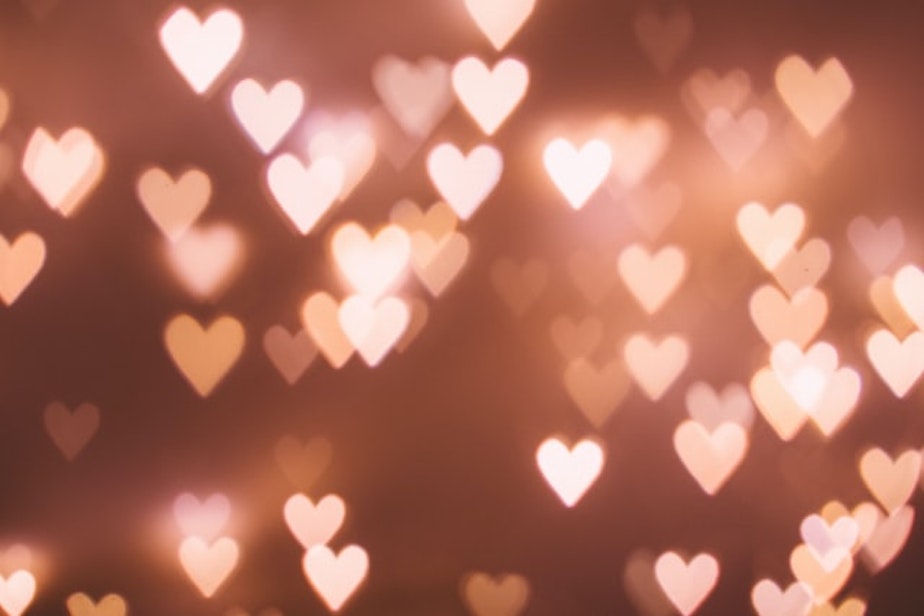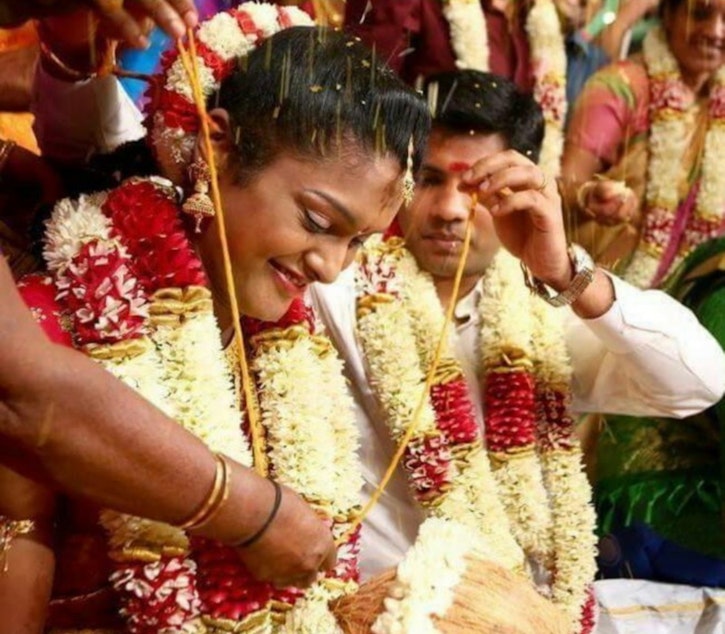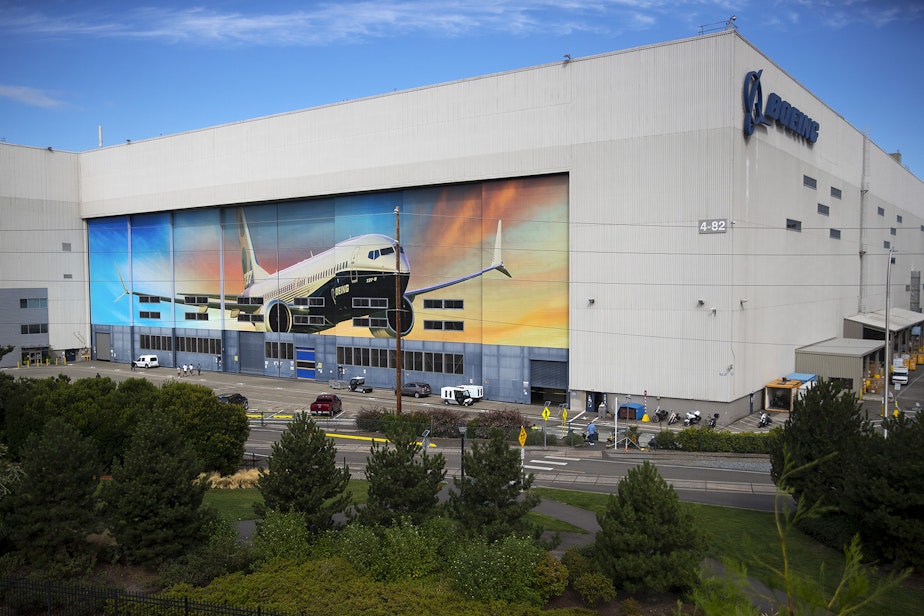Do you really love that?: Today So Far

- We say that we "love" things a lot, but does that diminish the power of the word?
- Seattle has embraced streateries, but not every neighborhood is so fond of them.
This post originally appeared in KUOW's Today So Far newsletter for Valentine's Day, February 14, 2023.
What do you love in life? And do you really mean that? I love typewriters, sushi, and Star Trek. Tom Petty knew a girl who loved Jesus, America, Elvis, horses, and her boyfriend, too. That’s a lot of affection going around. Do we really “love” people, places, and things as much as we say we do?
As Bill Radke endeavors to uncover words we overuse in our everyday life, an objection recently arose over the word “love.” Week in Review listener Claire Carter notes that people use the word to describe affection for just about everything — almonds, the rain, their city. But there are folks out there who would argue that love, twoo wuv, is something more; a complex concept, so exalted that we know it's there, but can’t always grasp it. Saying we "love" this and that could feel as if we're lessening the word's impact.
I am fond of typewriters, and I hold Star Trek in high esteem, but I would say that I love Nina, my wife. Sushi has never left me with a feeling that made a Carpenters' song suddenly make sense. Yet, after meeting Nina, I would say that birds suddenly appear, every time she is near.
Perhaps this is why the ancient Greeks broke love down into different genres. There was “philia,” for love between pals, and there was “storge” for the sort of love a parent has for a child. Then there was “eros,” which is sexy love. And “agape” for brotherly love, love of God, and general goodwill. Today, however, we don’t break this down and are likely to just say, “I love carpet. I love desk. I love lamp!”
Despite this cacophony of “love” thrown around conversations, it hasn’t stopped that deep down feeling from bringing folks together. Bronwen Stevenson sees it every day at Shotgun Weddings.
"I was knocked up, went to Vegas 30 years ago, and have been happily married ever since," she said on Week in Review, aka "Word in Review."
At Shotgun Weddings, couples can get married inside a shipping container next to the trailer park mall in Seattle’s Georgetown. For an additional fee, "Elvis" will conduct the ceremony.
"I think people come and really get to celebrate themselves, instead of having to cater to a bunch of people for this moment,” Stevenson said. “It's an intimate moment when you're marrying somebody and you actually get to focus on that person."
I have to say, I could not agree with Stevenson more. Her description of a wedding feels more genuine than the high-cost productions we commonly encounter these days. Of course, I am very biased in this regard. Nina and I eloped. Despite the small, isolated ceremony, it was just for us and felt more intimate and pure. It was beyond adoration on the level of The Carpenters. It was like a Celine Dion song.
As someone who is in the business of love, Stevenson would disagree with the notion the word is overused.
"I would say that if (love) was a word that is overused, I will take that word over a lot of other words ... Love, when you say it, it makes you feel good. If you are saying it more than ‘hate,’ if you are saying it more than ‘dislike,’ it's going to put endorphins in you at some point. If you're speaking about love, things that you love, you're going to feel happy … Are we going to limit ourselves from a word that really represents goodness. I would say use it more."
"There is so much sorrow in the world, but love happens anyway,” Stevenson said.
Perhaps love is so grand it cannot be isolated into any one person's definition. It's possible for both Carter and Stevenson (and the Greeks) to be correct. Love can be relative. It is possible to love sushi, and it is possible to fall in love with that special someone. And when "love happens," as Stevenson says, I'd argue that it can be an evolution and even mature into something stronger ... like a Michael Bolton song.
Check out Bill's Week in Review pondering the word "love" here.
Moving on, today's episode of Seattle Now considers an issue emerging around town: "Seattle loves streateries. Does Ballard Avenue?" Well, ugh, there's that word again.
The pandemic prompted Seattle officials to approve outdoor seating and dining arrangements for restaurants, which helped the city get with the times ... if "the times" were 100 years ago. But hey, better late than never. The streateries that have emerged appear like fancy pergolas in front of a restaurant, taking up sidewalks or parking spaces.
"It helps close a gap for restaurants, because Ballard, in the Seattle area, real estate to open a restaurant is really expensive, and when you have a license to open a sidewalk cafe, you get to open a bigger restaurant," Seattle Times reporter Tan Vinh told Seattle Now. "If I have a 20-seat cafe in Ballard, and I can put 10 seats out there, I have just really improved my income."
But Vinh adds that it's not all positive. There is controversy around these streateries, especially in neighborhoods like Ballard. Have you ever tried to get to Ballard? And then park? You not only have to factor in the time to travel there, but also to circle Ballard and find a place to park the car. Outside dining, eating up parking spaces, has not gone over well with some folks.
"A lot of people think it's an eyesore, because some of these ... look like a treehouse or a clubhouse that kids used to build in like sixth grade," Vinh said.
The Ballard Avenue Landmark District is currently considering pre-approved aesthetics to mitigate such concerns. Check out Seattle Now's coverage of the streatery issue here.
Side note: A treehouse restaurant sounds pretty awesome and I would totally go to one. Just throwing that out there for any entrepreneurial-minded foodies out there.
AS SEEN ON KUOW

Dhana Viswanathan and her husband, Balaji Viswanathan, at their wedding ceremony in Puducherry, a city in India, in 2015. Arranged marriage is common throughout India. Most married couples are set up by family, friends, or a matchmaker. But the practice isn't as common in the United States, where some people stereotype arranged marriages as unconventional or unloving. RadioActive’s Anjali Einstein talked to her family friend Dhana Viswanathan about her own experience with arranged marriage, and the love story that came out of the custom. (Courtesy of Dhana Viswanathan)
DID YOU KNOW?
Happy Valentine's Day! If you've ever received a valentine card, chocolates, flowers, etc. on this holiday, it likely came with a heart shape attached to it. And perhaps at some point, you may have wondered why that shape doesn't look anything like an actual heart. Turns out, the ❤ is a shape that spans history and various cultures.
In Japan, this shape is called "inome" and was used to ward off evil spirits. It has historically been placed on shrines, temples, and weapons. The shape also appeared in cultures spanning the Indus Valley (super long time ago) to ancient Greece and Rome. It was associated with the silphium plant, which had fruit that looked like a heart. The plant was further associated with love and other sexy stuff.
Still, it's unclear if these early heart-shape depictions were associated with lovey-dovey themes we would think of today. It's believed that the modern love angle came about during Europe's middle ages. Early depictions were more associated with symbols of pine cones or pears. Christianity and romantic themes were evolving during this time, so the heart evolved with it.
If you're like me, you probably had a thought that it's quite a leap from pine cones and fruits to the heart symbol. There's got to be more to it than that. Then again, perhaps in a few hundred years, someone will be writing a "Did You Know" segment about our era's popular symbols and have to explain where certain suggestive emojis came from.
ALSO ON OUR MINDS

As its ambitions soar, Air India orders 470 Boeing and Airbus aircraft
Air India is placing orders for 470 Boeing and Airbus aircraft, underlining the surging demand for increased mobility in a nation with a swelling middle class. It is Boeing's third largest sale of all time, in dollar value, and its second of all time in quantity.

